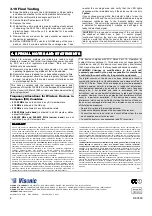
DE3580
3
H.
Tilt down or swivel the detector to face the desired direction.
Figure 7 shows the tilt/swivel possibilities.
I.
Once the detector is directed as desired, tighten the bracket
assembly screw well, to prevent any further change of position.
Figure 7.
Tilt / Swivel Limits
3.4 Battery Installation
The DISCOVERY W is powered by a 9-volt alkaline or lithium
battery. Remove the detector's front cover, snap the battery clip
onto the battery and place the battery in its place (below the
printed circuit board). Before testing, allow 10 minutes for the
detector to stabilize (the LED may light during this time).
Warning!
For proper operation, use only alkaline or lithium type
batteries.
3.5 System Code Selection
The code selector consists of an
8-key DIP switch (see Figure 8).
Each key is set to either ON or OFF
position to create a unique digital
system code combination (256
possibilities).
Select the desired digital code so that
it will match the one selected on the
companion receiver.
All wireless PIR detectors and the
receiver used in the alarm system
Figure 8.
System
Code Selector
must be set to the same digital system code.
CAUTION:
The code combination 2, 4, 5, 6, 7 ON / 1, 3, 8 OFF
is a factory setting that must be avoided. Also avoid codes such
as all keys ON, all keys OFF or alternating ON-OFF settings.
3.6 Channel Code Selection
The Visonic Ltd. wireless security systems have a multi-channel
capability. Each wireless DISCOVERY W detector can be set to
transmit one of 4 different channel codes. Each channel code
activates a particular output circuit of the companion receiver.
This feature is very useful for zoning
purposes - activation of different type of
zones at the control panel.
The channel selector consists of a 4-key
DIP switch (see Figure 9). The channel
code is selected by setting the key with
the desired channel number to ON.
If there is a low battery condition, a LOW
BATTERY alert code (code "0") will be
automatically
transmitted
once
every
2
Figure 9.
Channel
Code Selector
minutes, regardless of the channel selector setting. Code "0"
causes receivers equipped with a buzzer output to activate the
buzzer. Setting the 4 channel keys to OFF and initiating a
transmission is a way to check whether code "0" works.
Upon activation of the detector’s tamper switch (by removing the
front cover), channel "2" code will be automatically transmitted
once every 2 minutes, regardless of the channel selector setting.
Caution:
Do not select channel 2 as the normal alarm channel,
because this will cause alarm and tamper events to have the
same channel code.
3.7 Setting the Pulse Counter
The location of the pulse count selector is indicated in Figure 5.
Refer to Figure 10 below and mount the jumper as desired.
Figure 10.
Pulse Counter Setting Options
3.8 Vertical Adjustment
Refer to Figure 11. Loosen the vertical adjustment screw and
slide the printed circuit board up or down to obtain the desired
coverage. When done, tighten the screw well.
Figure 11.
Vertical Adjustment
3.9 Setting the TST/NORM Jumper
Since battery saving is of utmost importance in normal use of the
detector unit, an automatic timer inhibits the detector for
approximately 2 minutes after each transmission. During this
period, the transmitter cannot be triggered again by subsequent
motion within the protected area. The detector is automatically
rearmed 2 minutes after the last motion was detected.
For rapid walk testing of the coverage pattern, you must eliminate
the 2 minute inhibit interval between successive alarms. The
NORM/TEST selector, when set to TEST, overrides the 2-minute
rearm timer, and also sets the pulse counter to 1 PULSE.
Remember that in the TEST mode, tamper and low battery alerts
will be transmitted at 1/2 second intervals instead of the usual
2-minute intervals. When the selector is reset to NORM, the
rearm timer reverts to normal operation.
TEST Position
Setting the jumper as shown
enables the LED and overrides the rearm timer,
allowing you to walk test the detector.
NORMAL Position:
Setting the jumper as
shown disables the walk-test LED and enables
the 2-minute rearm timer.






















